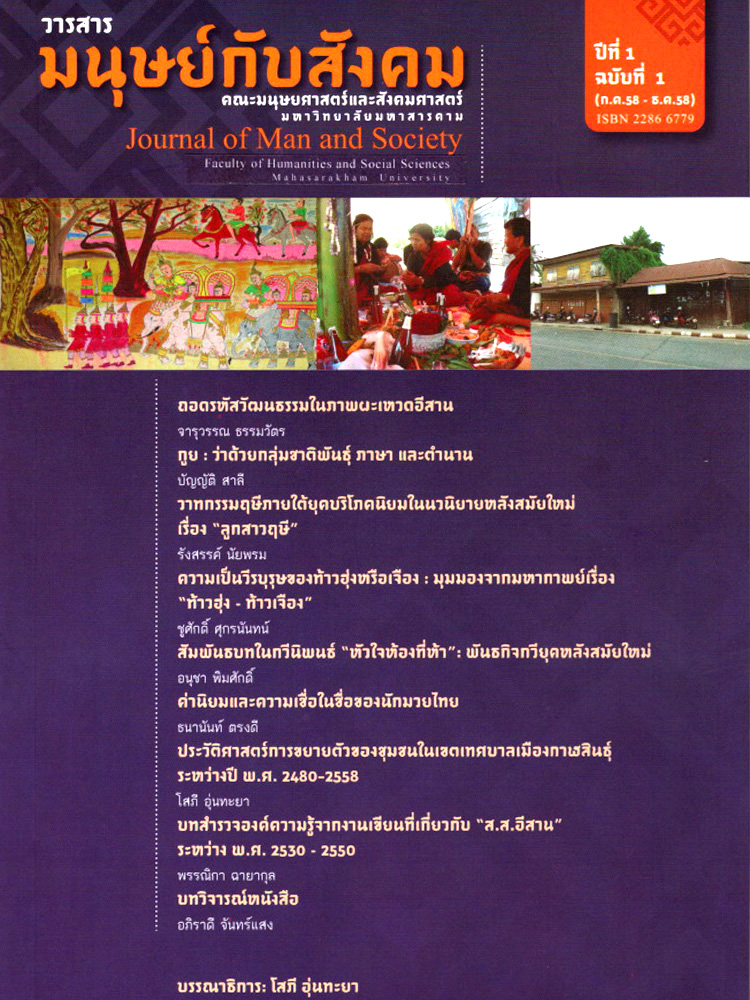วาทกรรมฤษีภายใต้ยุคบริโภคนิยมในนวนิยาย แนวหลังสมัยใหม่เรื่อง “ลูกสาวฤษี”
Main Article Content
บทคัดย่อ
ภายใต้สังคมแบบหลังสมัยใหม่ถูกนิยามว่าเป็นยุคของการบริโภคนิยมที่ได้ก่อให้เกิดปรากฏการณ์ทางสังคมในหลายมิติ โดยเฉพาะอย่างยิ่งการช่วงชิงความหมายของคน ชายขอบที่วิถีปฏิบัติถูกทำให้กลายเป็นสินค้าในเชิงวัฒนธรรมเพื่อสนองตอบความปรารถนาของสังคมเมือง บทความนี้มีวัตถุประสงค์เพื่อวิเคราะห์วาทกรรมฤษีภายใต้ยุคบริโภคนิยม โดยใช้ตัวบทคือ นวนิยายแนวหลังสมัยใหม่เรื่อง ลูกสาวฤษี ของปริทรรศหุตางกูรผลการศึกษาพบว่า คนชายขอบในสังคมเมืองต้องปรับเปลี่ยนอัตลักษณ์และวิถีปฏิบัติทางสังคมเพื่อให้อยู่รอดในยุคทุนนิยมผ่านกระบวนการประกอบสร้างความเป็นฤษี วาทกรรมฤษีจึงถูกนิยามและช่วงชิงความหมายในมิติที่หลากหลาย เช่น ตัวฤษีเองนิยามว่าลักษณะดังกล่าวคืออาชีพ ขณะที่คนนอกให้ความหมายทั้งในเชิงบวกและเชิงลบผ่านความแปลกประหลาด เพี้ยน บ้า เป็นลัทธิกลายพันธุ์ เป็นคลื่นวิกฤตศรัทธาศาสนา เป็นสภาวะหลงผิดหรือจิตหลอน เป็นพวกนอกรีตเดียรถีย์ เป็นปรากฏการณ์เหล้าเก่าปรุงขวดใหม่ ยุคบริโภคนิยมจึงประกอบสร้างความหมายให้ฤษีคือสินค้าและเป็นมหรสพทางสังคม นอกจากนี้ภาพของฤษียังถูกสร้างความหมายใหม่ในรูปแบบสภาวะความจริงเสมือน (simulation) และกลายเป็นสัญลักษณ์ของการหลุดพ้นจากระบบทุนนิยม วาทกรรมฤษีจึงเป็นการปะทะกันระหว่างโลก สัจนิยมและโลกมหัศจรรย์ และแสดงนัยยะของการวิพากษ์สังคมแบบบริโภคนิยมได้อีกทางหนึ่ง
Article Details

อนุญาตภายใต้เงื่อนไข Creative Commons Attribution-NonCommercial-NoDerivatives 4.0 International License.
เนื้อหาและข้อมูลที่ตีพิมพ์ลงในวารสารมนุษย์กับสังคม ถือเป็นข้อคิดเห็นและความรับผิดชอบโดยตรงของผู้เขียนซึ่งกองบรรณาธิการวารสารไม่จำเป็นต้องเห็นด้วยหรือร่วมรับผิดชอบใดๆ
บทความ ข้อมูล เนื้อหา รูปภาพ ฯลฯ ที่ได้รับการตีพิมพ์ในวารสารมนุษย์กับสังคม ถือเป็นลิขสิทธิ์ของวารสาร หากบุคคลหรือหน่วยงานใดต้องการนำทั้งหมดหรือส่วนหนึ่งส่วนใดไปเผยแพร่ต่อหรือเพื่่อกระทำการใดๆ จะต้องได้รับอนุญาตเป็นลายลักษณ์อักษรจากวารสารมนุษย์กับสังคมก่อน
เอกสารอ้างอิง
กาญจนา แก้วเทพ และสมสุข หินวิมาน. (2551). สายธารแห่งนักคิดทฤษฎีเศรษฐศาสตร์การเมือง กับสื่อสารศึกษา. กรุงเทพฯ: ภาพพิมพ์.
จันทนี เจริญศรี. (2544). โพสโมเดิร์นกับสังคมวิทยา. กรุงเทพฯ: วิภาษา.
ชญาน์ทัต ศุภชลาศัย. (2556). ความใกล้ชิดของความหมายแห่งชีวิต : สังคมวิทยาชีวิตประจำวัน. กรุงเทพฯ: สยามปริทัศน์.
ชูศักดิ์ ภัทรกุลวณิชย์. (2555). สัจนิยมมหัศจรรย์ไทยในคาถาภูมิปัญญาท้องถิ่น. อ่าน, 4(1), 38-62.
ไชยรัตน์ เจริญสินโอฬาร. (2554). แนะนำสกุลความคิดหลังโครงสร้างนิยม. กรุงเทพฯ: สมมติ.
ถนอมนวล หิรัญเทพ. (2551). วาทกรรมความพิการในเรื่องเล่าสมัยใหม่ของไทย. วิทยานิพนธ์อักษรศาสตรดุษฎีบัณฑิต สาขาวิชาวรรณคดีและวรรณคดีเปรียบเทียบ จุฬาลงกรณ์มหาวิทยาลัย.
นรชิต จิรสัทธรรม. (2553). โพสต์โมเดิร์นกับเศรษฐศาสตร์ : บทวิพากษ์สมมุติฐานความมีเหตุผลทางเศรษฐศาสตร์. กรุงเทพฯ: วิภาษา.
ปริตตา เฉลิมเผ่า กออนันตกูล. (2544). ชีวิตชายขอบ : ตัวตนกับความหมาย กรณีศึกษาเกย์หญิงรักหญิง คนชรา คนเก็บขยะ วัยรุ่น เด็กข้างถนน. กรุงเทพฯ: ศูนย์มานุษยวิทยา.
ปริทรรศหุตางกูร. (2549). ลูกสาวฤษี. กรุงเทพฯ: แพรสสำรักพิมพ์.
ศูนย์มานุษยวิทยาสิรินธร. (2550). การเดินทางของสินค้าสมัยใหม่. กรุงเทพฯ: ศูนย์มานุษยวิทยาสิรินธร.
เสาวณิต จุลวงศ์. (2550). ความซับซ้อนของการเล่าเรื่อง : ลักษณะหลังสมัยใหม่ในบันเทิงคดีร่วม สมัยของไทย. วิทยานิพนธ์อักษณศาสตรดุษฎีบัณฑิต สาขาวิชาวรรณคดีและวรรณคดีเปรียบ จุฬาลงกรณ์มหาวิทยาลัย.
Berney, Darin. (2004). The network society. Cambridge: Polity.


